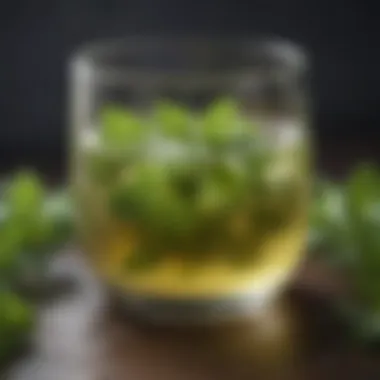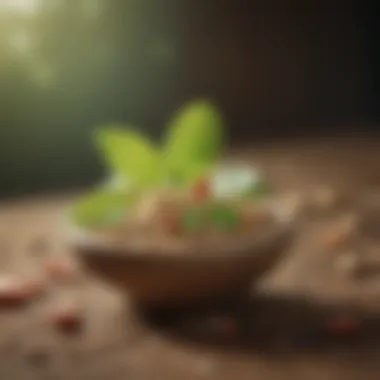Explore the Intriguing World of Herbal Remedies for Anxiety


Understanding Mental Health and Well-being
In understanding mental health, one must delve into the intricacies of the mind and its impact on well-being. Mental health encapsulates the state of one's emotional, psychological, and social well-being, influencing how individuals think, feel, and act. It is vital to prioritize mental well-being as it forms the foundation for overall health and quality of life. Neglecting mental health can lead to a range of challenges and disorders that affect daily functioning and interpersonal relationships.
What is Mental Health?
Mental health refers to the cognitive, emotional, and social well-being of individuals. It encompasses how people navigate stress, relate to others, and make choices. Mental health is essential for coping with life's challenges, fostering resilience, and maintaining balance in various aspects of life. It is a dynamic state that evolves based on experiences and influences from internal and external factors.
The Importance of Prioritizing Mental Well-being
Prioritizing mental well-being is fundamental for achieving overall health and happiness. It involves recognizing the significance of emotional and psychological health in daily functioning and decision-making. Cultivating a positive mental state enhances personal resilience, promotes self-awareness, and fosters healthy relationships. By prioritizing mental well-being, individuals can better manage stress, navigate life transitions, and nurture their inner growth.
Common Mental Health Challenges and Disorders
Common mental health challenges and disorders encompass a wide spectrum of conditions that affect mood, behavior, and cognition. These may include anxiety disorders, depression, bipolar disorder, schizophrenia, and other conditions that impact daily living. Understanding these challenges is crucial for promoting empathy, reducing stigma, and enhancing support systems for individuals navigating mental health complexities.
Introduction
In this segment, we embark upon a journey into the realm of herbal remedies for anxiety, a topic that holds significant importance in the context of holistic wellness and mental health. The exploration of herbs used in anxiety management serves as a bridge between ancient traditional practices and cutting-edge scientific research, shedding light on the potential benefits and drawbacks of these natural interventions. By delving into the historical significance and contemporary relevance of utilizing herbs to alleviate anxiety, we aim to cultivate a nuanced understanding of this age-old practice.
Understanding Anxiety
Anxiety, a pervasive and often debilitating mental health condition, affects individuals on a global scale, warranting a closer examination of its intricacies and implications. Understanding the complexities of anxiety involves unraveling its physiological and psychological components, exploring the various manifestations of this condition, and recognizing the diverse triggers that can precipitate anxious feelings. By delineating the spectrum of anxiety disorders and elucidating the profound impact they can have on one's well-being, we lay the groundwork for comprehending the multifaceted nature of anxiety and the necessity of exploring diverse treatment modalities.
Rise of Herbal Remedies


The surge in interest surrounding herbal remedies for anxiety heralds a paradigm shift towards natural interventions in mental health care. As individuals increasingly seek alternatives to conventional pharmaceutical approaches, herbs have emerged as vital players in the quest for holistic well-being. This section delves into the historical evolution of herbal remedies for anxiety, tracing their roots back to ancient healing traditions and elucidating how these botanical solutions have garnered contemporary scientific interest. By examining the growing popularity and efficacy of herbal treatments in managing anxiety, we navigate the intricate landscape of natural medicine and its intersection with modern psychiatric practices. The rise of herbal remedies represents a compelling narrative of resilience, evolution, and a profound commitment to exploring diverse avenues for mental health support.
Traditional Herbs
Traditional herbs play a significant role in the realm of anxiety management, serving as natural alternatives to conventional medications. These herbs have been utilized for centuries due to their purported calming and relaxing properties. Traditional remedies offer a holistic approach to mental well-being, harnessing the power of nature to alleviate symptoms of anxiety. They are esteemed for their gentle yet effective qualities, making them a favorable choice for individuals seeking natural options for anxiety relief.
Valerian Root
Valerian root, a herb native to Europe and Asia, is renowned for its potential calming effects on the nervous system. It is commonly used as a sleep aid and to relieve symptoms of anxiety and restlessness. Valerian root is believed to increase the levels of GABA in the brain, a neurotransmitter known for promoting relaxation and reducing stress. However, caution is advised as some individuals may experience mild side effects such as daytime drowsiness or digestive issues when consuming valerian root.
Chamomile
Chamomile, a delicate flower with powerful calming properties, has long been celebrated for its soothing effects on the mind and body. Chamomile is often consumed as a tea or in supplemental form to reduce anxiety symptoms, improve sleep quality, and promote relaxation. This herb contains compounds that may bind to the same brain receptors as anti-anxiety medications, potentially offering a natural alternative for anxiety management. Nevertheless, individuals allergic to ragweed may experience allergic reactions to chamomile and should exercise caution.
Passionflower
Passionflower, a climbing vine native to the southeastern United States, is a cherished herbal remedy for anxiety and sleep disorders. This herb is believed to increase levels of GABA in the brain, similar to how certain anti-anxiety medications work. Passionflower is commonly used to reduce restlessness, nervousness, and insomnia. While generally considered safe, some individuals may encounter side effects such as dizziness or confusion. It is advisable to consult a healthcare provider before incorporating passionflower into your wellness routine.
Lavender
Lavender, revered for its calming aroma and medicinal properties, is a versatile herb used in various forms, including essential oils, teas, and supplements. Lavender is valued for its anxiolytic effects, promoting relaxation and alleviating stress and anxiety symptoms. Inhalation of lavender essential oil has shown to reduce anxiety levels and improve mood. However, lavender supplements may interact with certain medications, emphasizing the importance of consulting with a healthcare professional before use. Incorporating lavender into daily rituals like aromatherapy or tea consumption can aid in stress reduction and enhance overall well-being.
Scientific Research
In this comprehensive guide focused on exploring herbs for anxiety, the section of Scientific Research holds significant importance. It bridges the gap between traditional herbal practices and modern scientific validation. By delving into scientific research, we can gain valuable insights into the effectiveness and safety of herbs in managing anxiety. Understanding the mechanisms through which these herbs act on the body is crucial for individuals seeking evidence-based approaches to mental health.
Scientific studies provide us with concrete data on how herbs like Kava Kava, Ashwagandha, Rhodiola Rosea, and Lemon Balm exert their anxiolytic effects. These studies help in establishing dosage recommendations, identifying potential side effects, and highlighting any interactions with medications. By citing reputable research sources, we can further elucidate the credibility and reliability of the information presented.


Furthermore, the Scientific Research section serves as a compass for individuals navigating the vast sea of herbal remedies. It equips readers with the knowledge to make informed decisions and empowers them to distinguish between hearsay and scientifically backed facts. As mental health awareness grows, the demand for substantiated information on herbal interventions escalates, making this section a cornerstone of the article.
Kava Kava
Kava Kava, scientifically known as Piper methysticum, is a herb native to the South Pacific regions. Traditional cultures have used Kava Kava for its anxiolytic properties for centuries. The active compounds in Kava Kava, known as kavalactones, interact with neurotransmitters in the brain, inducing a calming effect.
Recent studies have delved into the efficacy of Kava Kava in reducing symptoms of anxiety. Research suggests that Kava Kava may be beneficial for individuals experiencing mild to moderate anxiety levels. However, caution must be exercised due to potential risks of hepatotoxicity associated with its long-term use.
While Kava Kava shows promise in anxiety management, consulting a healthcare provider is imperative before its consumption. By providing a detailed overview of Kava Kava's mechanisms of action and safety considerations, individuals can make informed choices regarding its incorporation into their wellness routines.
Ashwagandha
Ashwagandha, also known as Withania somnifera, is an adaptogenic herb with a long history in Ayurvedic medicine. Renowned for its ability to combat stress and enhance resilience, Ashwagandha has garnered attention in the field of mental health.
Scientific investigations into Ashwagandha have revealed its profound impact on stress reduction and anxiety levels. By modulating the body's stress response pathways, Ashwagandha assists in promoting a state of calmness and relaxation. Additionally, Ashwagandha demonstrates neuroprotective properties, further contributing to its potential in anxiety management.
Consumers should be mindful of the source and quality of Ashwagandha products due to variations in potency and purity. Consulting a healthcare provider before initiating Ashwagandha supplementation is advised, especially for individuals with underlying medical conditions.
Rhodiola Rosea
Rhodiola Rosea, a herb native to the Arctic regions, has gained recognition for its adaptogenic properties. This herb aids the body in adapting to stressors, thereby supporting mental resilience and well-being.
Research on Rhodiola Rosea highlights its role in improving cognitive function, elevating mood, and reducing symptoms of anxiety and fatigue. The bioactive compounds present in Rhodiola Rosea contribute to its stress-alleviating effects by regulating neurotransmitters and hormonal responses.
Individuals considering Rhodiola Rosea as part of their anxiety management approach should be aware of potential interactions with medications and optimal dosage guidelines. The inclusion of Rhodiola Rosea in one's wellness regimen should be undertaken with guidance from a healthcare professional.
Lemon Balm


Lemon Balm, scientifically known as Melissa officinalis, is a herbaceous plant known for its calming and mood-enhancing properties. Its citrusy aroma and soothing effects make it a popular choice in herbal blends designed to alleviate stress and anxiety.
Recent scientific investigations have shed light on Lemon Balm's ability to modulate GABA receptors in the brain, promoting relaxation and reducing anxiety levels. Lemon Balm also exhibits antiviral and antioxidant properties, adding to its therapeutic profile.
While Lemon Balm is generally considered safe for consumption, individuals should be mindful of potential allergic reactions and its interactions with certain medications. Consulting a healthcare provider when incorporating Lemon Balm into one's wellness routine is advisable to ensure optimal efficacy and safety.
Dosage and Precautions
In the realm of managing anxiety with herbal remedies, understanding dosage and precautions is paramount for safe and effective usage. Delving into the intricacies of dosage not only ensures optimal benefits but also minimizes the risk of adverse effects. Proper dosing of herbs can vary significantly based on factors such as the individual's age, weight, overall health condition, and the form of the herb being used, whether in teas, capsules, tinctures, or essential oils. It is crucial to follow recommended dosage guidelines provided by reputable sources or healthcare professionals to prevent both underdosing, which may yield no benefits, and overdosing, which can lead to potential harm. Moreover, being mindful of precautions underscores the importance of being aware of any allergies, sensitivities, or existing health conditions that may interact adversely with certain herbs used for anxiety. Always consult with a qualified healthcare provider before incorporating herbal treatments, as they can offer personalized guidance tailored to individual needs and medical history.
Consultation with a Healthcare Provider
When contemplating using herbal remedies for anxiety, consulting with a healthcare provider is a critical step towards ensuring safe and effective treatment. Healthcare professionals, particularly those well-versed in herbal medicine or integrative healthcare, can provide valuable insights into suitable herbs, proper dosages, likely benefits, and potential risks based on an individual's specific health profile. This consultation allows for a comprehensive evaluation of the individual's overall health status, existing medications, and any underlying conditions that may influence the choice of herbal remedies. Additionally, healthcare providers can offer guidance on possible interactions between herbs and conventional medications, minimizing the risk of adverse reactions. Open communication with a healthcare provider fosters a collaborative approach to anxiety management, promoting a holistic and well-informed decision-making process regarding the incorporation of herbal treatments into one's wellness regimen.
Potential Side Effects
While herbal remedies offer a natural approach to anxiety management, it is crucial to be aware of potential side effects that may arise from their usage. Common side effects associated with certain herbs used for anxiety include gastrointestinal discomfort, dizziness, drowsiness, allergic reactions, and interactions with other medications. Individuals should closely monitor their body's response to herbal treatments and promptly report any adverse effects to their healthcare provider. Understanding the potential side effects of herbs can help individuals make informed choices, adjust dosages if necessary, or consider alternative herbs with more favorable profiles. Prioritizing safety and well-being, individuals should heed precautionary measures, such as starting with low doses, observing for reactions, and discontinuing use if adverse effects persist or worsen.
Interactions with Medications
Exploring the interactions between herbal remedies and medications is crucial to prevent any potential conflicts that may compromise efficacy or safety. Certain herbs used for anxiety can interact with prescription or over-the-counter medications, affecting their absorption, metabolism, or overall effects on the body. To mitigate risks associated with interactions, individuals should disclose all supplements and herbs they are using to their healthcare provider, enabling a thorough review of possible synergies or contraindications with prescribed medications. This transparency facilitates informed decision-making regarding herb-drug combinations, allowing healthcare providers to adjust dosages, monitor effects, or recommend alternative approaches to avoid detrimental interactions. Staying vigilant about herb-medication interactions promotes the judicious and harmonious integration of herbal remedies into one's wellness routine, fostering optimal outcomes in managing anxiety effectively and safely.
Conclusion
In the realm of herbal remedies for anxiety, the conclusion serves as a pivotal point of understanding and reflection in this exhaustive guide. As we traverse the intricacies of traditional herbs and delve into the nuances of scientific research, it becomes apparent that the conclusion encapsulates the essence of our journey towards anxiety management through natural means.
One of the key elements highlighted in this conclusion is the emphasis on holistic well-being. By exploring a diverse range of herbs, from Valerian Root to Ashwagandha, we aim to elucidate the interconnectedness of mind, body, and nature in combating anxiety. Each herb's unique properties and benefits contribute to a comprehensive approach to mental health, ensuring a wholesome and balanced well-being.
Furthermore, the conclusion sheds light on the importance of individuality in herbal remedy adoption. Understanding that what works for one may not work for another, the personalized nature of herbal treatments is underscored. This acknowledgement of varied responses to herbs emphasizes the need for a tailored and patient-centric approach to anxiety management, fostering a sense of empowerment and autonomy in individuals seeking relief.
Moreover, the conclusion underscores the significance of caution and informed decision-making. By discussing potential side effects and interactions with medications, we underscore the need for vigilance and consultation with healthcare providers. This cautionary approach ensures that individuals navigate the realm of herbal remedies for anxiety with prudence and mindfulness, prioritizing safety and efficacy in their treatment choices.
In essence, the conclusion serves as a reservoir of wisdom and guidance, synthesizing the multifaceted aspects of herbal remedies for anxiety into a coherent and insightful narrative. By encapsulating the essence of our exploration and offering valuable insights into usage, benefits, and precautions associated with various herbs, the conclusion stands as a beacon of knowledge for individuals embarking on a journey towards holistic mental well-being.















